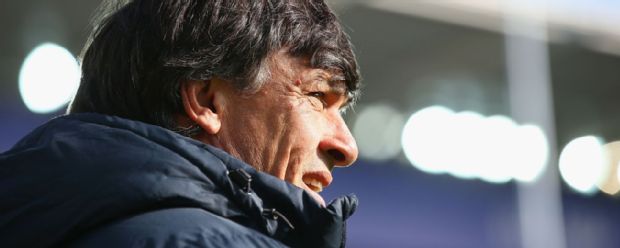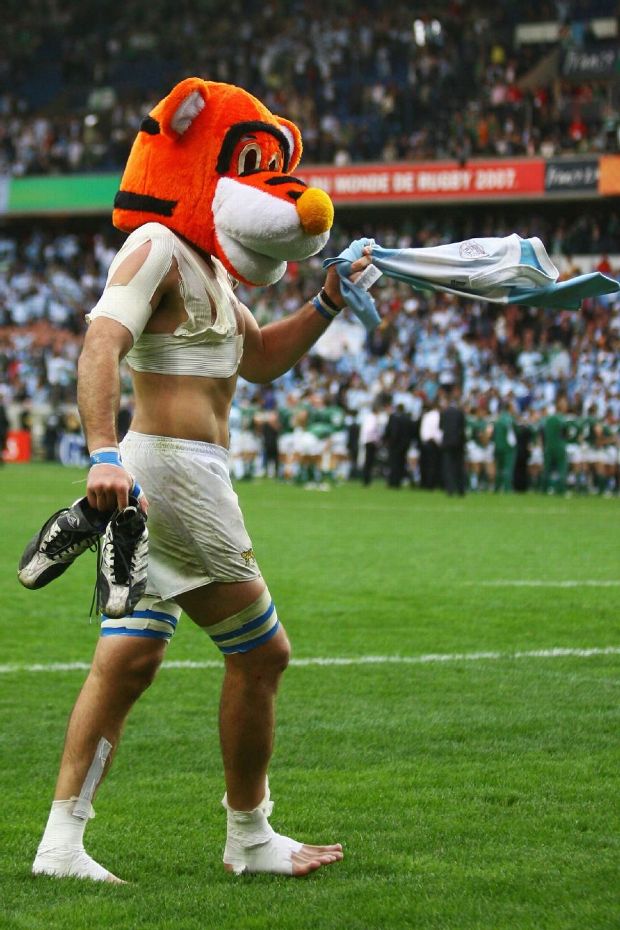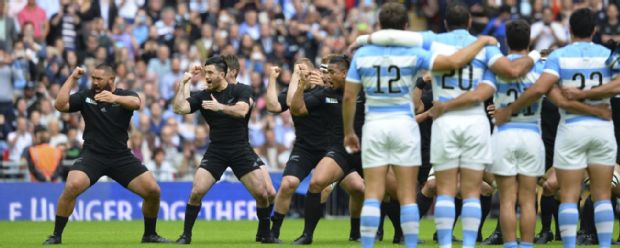|
Rugby World Cup
Europe's Six Nations loss is Argentina's Rugby World Cup gain
Greg Growden
October 21, 2015
Can Argentina pull off the unthinkable?
LONDON -- Success involves distress. And Argentina has certainly experienced its fair share of pain since taking the giant step of joining the Rugby Championship four years ago. The opening seasons tussling with New Zealand, Australia and South Africa were grueling and often thankless, the Pumas discovering they were well short of the mark. They were constantly exposed as a one-dimensional, forward-obsessed operation. They lacked the pace, a proper understanding of backline play or a Plan B to be anything more than an irritation. Even now, their Rugby Championship record is hardly overwhelming, with just two victories and a draw in 21 appearances. But the rewards have gradually come - defeating Australia in Mendoza last season and South Africa in Durban this year. To Argentina's credit they were never overwhelmed by the enormous challenge. They didn't look for excuses. They continually tried to improve, pursuing coaches from overseas, including chasing Michael Cheika before New South Wales Waratahs and then the Australian Rugby Union signed him up. They readily sought advice from elsewhere, which saw them bring in Sir Graham Henry as an adviser. And after discovering their head coach Santiago Phelan wasn't providing enough inspiration, they opted for the far more adventurous Daniel Hourcade to head their operation.  Daniel Hourcade, head coach of Argentina, looks on© Matt Lewis - World Rugby/World Rugby via Getty Images Superb Argentina stun Ireland
%]Most importantly they realised they had to adapt and be prepared to change their approach if they were to be anything more than a speed hump for the All Blacks, Wallabies and Springboks. A brilliant scrum was simply not enough. You also had to do something inventive with the ball, rather than handing it to your No.10 and booting it into the clouds. Tries had to become their focus. So the emphasis changed to the 15-man game, and the advancements have been on show during this tournament - in particular during the quarterfinal victory over Ireland in which their attack produced a succession of cleverly constructed backline tries. And now for the first time, the world media is obsessing over their backline and not bringing up the old bajada line. They are currently ranked second for the number of tries scored in the Rugby World Cup, with 26, behind New Zealand on 34, and ahead of South Africa 24 and Australia 22; Ireland is the highest-placed of the northern contingent with 18.  Juan Imhoff and the Pumas backline are now prolific© Matt Lewis/World Rugby via Getty Images Argentina must now be highly relieved that the north rejected them after the 2007 World Cup. Their semifinal appearance in that tournament prompted a concerted Argentine campaign to be included in the Six Nations. Their request made sense at the time, as so many of their players were living and playing in Europe. But the request was rejected, and Argentina remained in limbo until SANZAR agreed to include them in an expanded Rugby Championship from 2012.  Juan Martin Fernandez-Lobbe celebrates success in 2007© Shaun Botterill/Getty Images  Juan Martin Fernandez-Lobbe celebrates success in 2007© Shaun Botterill/Getty Images
As the Argentina defence coach Pablo Bouza explained this week, the Pumas finished up in a far better competition. "I do not think we would have made as much progress had we joined the Six Nations, especially in the way our style has developed," Bouza said. "The Rugby Championship has been great for us -- it was tough at the start and we had to learn. "It is a different style to the Six Nations. When we tour Europe in the autumn, the pitches are slow and it is tough to get quick ball to play with. We used to play New Zealand every six or seven years but we have faced them nine times since 2011. As players and coaches we learn every time we play them, and the Rugby Championship is good for our style of play because it is all about getting quick ball." As crucially, head coach Hourcade realised the need for dramatic change. "Since Daniel started he has liked the positive brand of rugby, so we came with him," Bouza said. "He thinks it is the best rugby for us. And he convinced the players to do that in every match." There's the lesson. As Argentina have discovered, you must be prepared to broaden your horizons. You also must realise you have to play the best on a regular basis you are to be the best.  Argentina look on as New Zealand perform the haka at Wembley© GLYN KIRK/AFP/Getty Images New Zealand, Australia, South Africa have dominated for so long -- and Argentina have joined them in dominating this World Cup - because the high standard of the competitions they are involved in means they are constantly forced to perform under pressure. They get an understanding of how to win the tight ones. They know they have to win the tight ones -- as has occurred during this World Cup. Argentina will get even better in that area, after several years of being involved in the Super Rugby competition they are joining next season. Super Rugby is a five-month torture test in which players are forced to endure the most difficult of match schedules that also involve extensive, often mind numbing travel routines. Week in week out, there are no easy games, no moments when a player or coach can hide. It is demanding on both the body and mind, forcing the athlete to prepare diligently. The tension is always there, as the public interest in Super Rugby is virtually on a par with Test football. It is not looked upon as an inferior product. And Super Rugby is definitely not glorified basketball - as it has often been described in the north. Super Rugby quickly exposes the weak, and only the strongest, most resilient and also the most daring, due to the tournament's bonus-point system, survive. The survivors now provide the base of three of the semi-finals teams, and they are the players who are producing at the right time of this tournament. As the Pumas have gleefully discovered, the northern hemisphere alternatives to Super Rugby and the Rugby Championship don't have that edge.
© ESPN Sports Media Ltd.
|
Live Sports
Communication error please reload the page.
-
Football
-
Cricket
-
Rugby
-
- Days
- Hrs
- Mins
- Secs
F1 - Abu Dhabi GP
Abu Dhabi Grand Prix December 11-131. Max Verstappen ()
2. Valtteri Bottas (Mercedes)
3. Lewis Hamilton (Mercedes)
4. Alexander Albon ()
5. Lando Norris ()
6. Carlos Sainz Jr ()
-
ESPNOtherLive >>
Darts - Premier League
Golf - Houston Open
Snooker - China Open
Tennis - Miami Open

